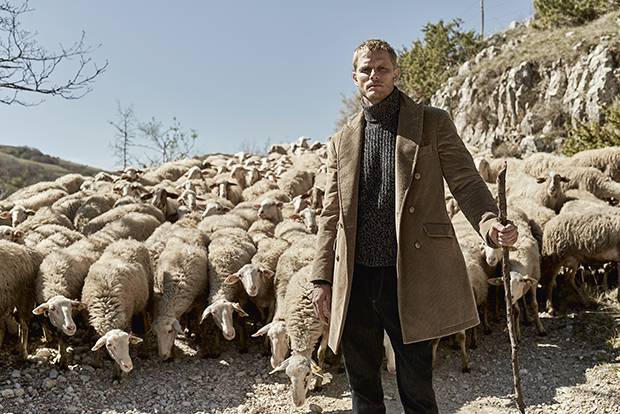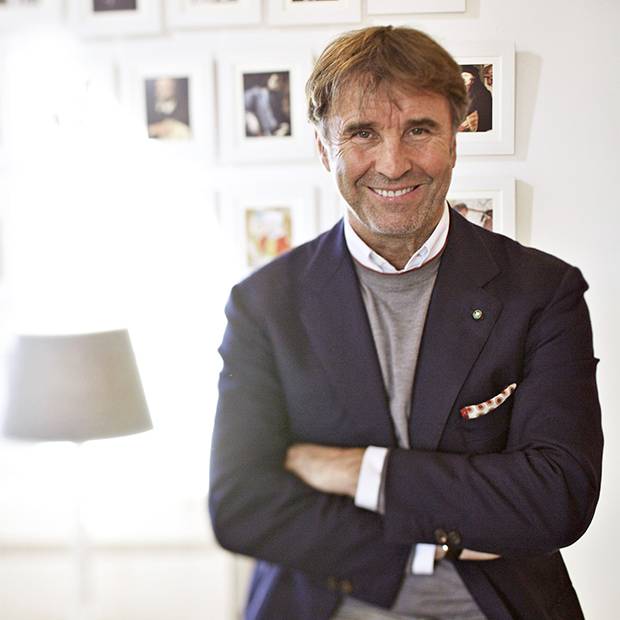The best way to understand the appeal of Brunello Cucinelli is to try on one of his sweaters for yourself. I arrived at Harry Rosen's Bloor Street store one recent afternoon for that purpose, and slipping a grey wool and cashmere crewneck over my shoulders, a new world was revealed.
The garment itself looks unremarkable at a glance but when worn it feels so light as to hardly be there at all. Despite this ethereality, however, it remains surprisingly warm — like a hug from a friendly spectre. The price for this sweater is $845, which is a bargain for Cucinelli. Nearby, a $4,395 double-faced cashmere cardigan sits precisely folded in a glass display case, relic-like. I try that one on as well, and while I don't care for its rich cranberry hue, if its provenance weren't written on the hangtag I'd swear it was knit from unicorn hair.
There are few designers as synonymous with a single fibre as Brunello Cucinelli, who at 64 years old presides over an empire of cashmere. The son of a factory worker, Cucinelli dropped out of engineering school at age 24 to hawk brightly-coloured cashmere sweaters. With no experience in the fashion industry but a lot of ideas, he spun that first business venture into a globe-spanning luxury juggernaut with stores from Vancouver to Doha and revenues close to half a billion dollars. While Cucinelli's brand still revolves around sweaters, it has grown into a full line of suiting, outerwear, sneakers and sweatsuits, all of which incorporate cashmere at every opportunity. Cucinelli is now known for two things: the exceptional quality of his materials and the exorbitant prices his customers are willing to pay for anything bearing his name. The key to both of these things is the man himself.
"The company started on the foundation that business should comply in the noblest manner with a humanistic enterprise at the core," Cucinelli says, via an interpreter. Such baroque pronouncements are common from the designer, who is an ardent admirer of Aristotle, Socrates and Marcus Aurelius. He approaches his work as a sort of philosopher-magnate, moving through the worlds of commerce and fashion with equal parts shrewd business sense and humanistic magnanimity.

While Cucinelli’s brand still revolves around sweaters, it has grown into a full line of suiting, outerwear, sneakers and sweatsuits, all of which incorporate cashmere at every opportunity.
Brunello Cucinelli lives in Solomeo, a medieval Italian village that's home to his headquarters and his factory; all of his clothes are made in Italy, with the majority produced in the surrounding Umbria region. Here, Cucinelli is a benevolent emperor, building theatres, restoring historic buildings and piazzas, and inscribing quotes from Shakespeare and Plato into the stonework. Factory workers are paid above market rate, and are treated to 90-minute lunch breaks with wine and restaurant-quality food available at the subsidized cafeteria. They are encouraged to take part in theatre productions and choral groups, and read the classics in a library stocked with Dante, Kafka and Nietzsche. "My company is only as strong as the people behind it, Cucinelli says. "So I believe in investing in the quality of life for our employees."
While the work environment in Solomeo bears resemblance to that at tech companies like Apple and Google, Cucinelli's approach seems wholly more utopian: he's not simply trying to give his employees fewer reasons to go home. "I believe that work elevates human dignity and creative results come from their happiness," he says, recalling the indignities his father suffered working at a cement factory, and the effect it had on his state of mind. "It was probably then that I began to understand the important role work plays in men's lives," he says. "I started to think that whatever I would do in my life, I'd work for human dignity."

Cucinelli is now known for two things: the exceptional quality of his materials and the exorbitant prices his customers are willing to pay for anything bearing his name.
Many people who buy a Cucinelli sweater don't know any of this, of course. They are simply taken in by the garments themselves, which are as understated as they are luxurious. Unlike brands whose logos are worth more than the products they embellish, his line succeeds through its expression of ease, comfort and quiet Italian luxury. The more one finds out about Cucinelli, however, the Plato-quoting fashion magnate who believes equally in the power of the human spirit and the power of immaculate knitwear, the more one wants to dress like him. Add in the notion of your $4,000 sweater being sewn by a happy craftsman in a medieval village and the fantasy is complete. The sweater itself is beautiful, of course, but that's not the entire point.
"The passion that he brings to what he does is not something that's easily duplicatable," says Larry Rosen, Harry Rosen's CEO, who's been buying from Cucinelli for over a decade. "He's got a very unique signature. If other brands could do it they would — and believe me, other brands have tried." Rosen concedes that owning a Cucinelli is not in all of his customers' budgets, but to those who can afford it, wearing one of these garments is a unique and privileged experience. "The truth is that when you put it on you can feel the difference," he says. "It just feels… very Cucinelli."
Visit tgam.ca/newsletters to sign up for the Globe Style e-newsletter, your weekly digital guide to the players and trends influencing fashion, design and entertaining, plus shopping tips and inspiration for living well. And follow Globe Style on Instagram @globestyle.
